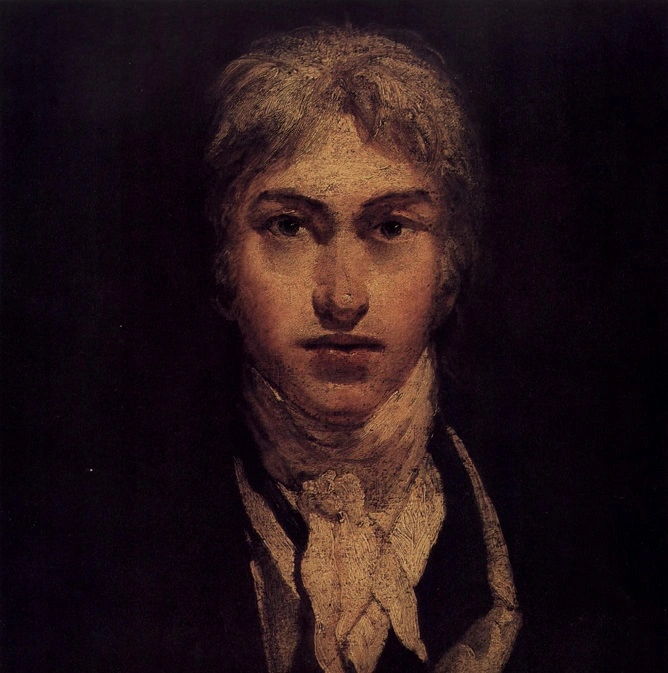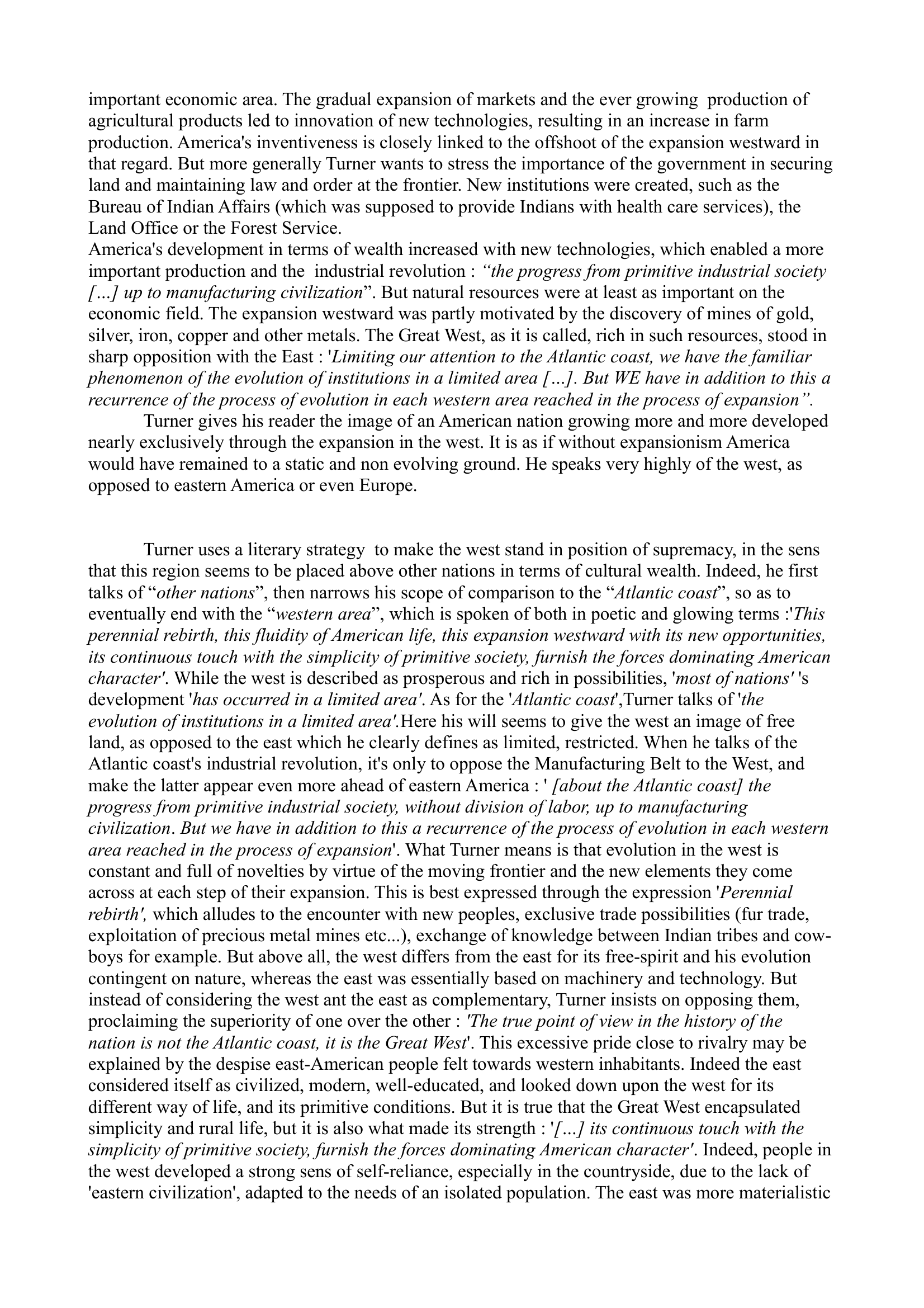THE SIGNIFICANCE OF THE FRONTIER IN AMERICAN HISTORY THE FRONTIER THESIS FREDERICK JACKSON TURNER
Publié le 19/04/2012

Extrait du document

1890
This text is part of Frederick Jackson Turner's thesis on the American frontier which was presented at the meeting of the American Historical Association in 1893. As a historian, he gives his own vision and interpretation on the meaning of the frontier. As a consequence the XXIth
century reader must take into account that at the time it was a contemporary point of view. In other words Turner can hardly be objective, and we shall try to analyze in context what led to the features he attributes to his conception of the American frontier, and what kind of problematic results from this thesis. Turner begins by quoting the census of 1890 which reads that the frontier is closed. He then comments upon this declaration and argues about the idea of the frontier not only as a
geographical area, but also as a concept which shaped American's identity, involving a link between expansionism and America's development, a sharp contrast between western and eastern cultures, as well as the issues revolving around human factors. By developing those themes, we will try to answer the question of “In which ways does Turner idealize the expansion westward” in parallel of a study of historical facts.

«
important economic area.
The gradual expansion of markets and the ever growing production of
agricultural products led to innovation of new technologies, resulting in an increase in farm
production.
America's inventiveness is closely linked to the offshoot of the expansion westward in
that regard.
But more generally Turner wants to stress the importance of the government in securing
land and maintaining law and order at the frontier.
New institutions were created, such as the
Bureau of Indian Affairs (which was supposed to provide Indians with health care services), the
Land Office or the Forest Service.
America's development in terms of wealth increased with new technologies, which enabled a more
important production and the industrial revolution : “the progress from primitive industrial society
[…] up to manufacturing civilization ”.
But natural resources were at least as important on the
economic field.
The expansion westward was partly motivated by the discovery of mines of gold,
silver, iron, copper and other metals.
The Great West, as it is called, rich in such resources, stood in
sharp opposition with the East : ' Limiting our attention to the Atlantic coast, we have the familiar
phenomenon of the evolution of institutions in a limited area […].
But WE have in addition to this a
recurrence of the process of evolution in each western area reached in the process of expansion”.
Turner gives his reader the image of an American nation growing more and more developed
nearly exclusively through the expansion in the west.
It is as if without expansionism America
would have remained to a static and non evolving ground.
He speaks very highly of the west, as
opposed to eastern America or even Europe.
Turner uses a literary strategy to make the west stand in position of supremacy, in the sens
that this region seems to be placed above other nations in terms of cultural wealth.
Indeed, he first
talks of “ other nations ”, then narrows his scope of comparison to the “ Atlantic coast ”, so as to
eventually end with the “ western area ”, which is spoken of both in poetic and glowing terms :' This
perennial rebirth, this fluidity of American life, this expansion westward with its new opportunities,
its continuous touch with the simplicity of primitive society, furnish the forces dominating American
character' .
While the west is described as prosperous and rich in possibilities, ' most of nations' 's
development ' has occurred in a limited area' .
As for the ' Atlantic coast ',Turner talks of ' the
evolution of institutions in a limited area'.
Here his will seems to give the west an image of free
land, as opposed to the east which he clearly defines as limited, restricted.
When he talks of the
Atlantic coast's industrial revolution, it's only to oppose the Manufacturing Belt to the West, and
make the latter appear even more ahead of eastern America : ' [about the Atlantic coast] the
progress from primitive industrial society, without division of labor, up to manufacturing
civilization .
But we have in addition to this a recurrence of the process of evolution in each western
area reached in the process of expansion '.
What Turner means is that evolution in the west is
constant and full of novelties by virtue of the moving frontier and the new elements they come
across at each step of their expansion.
This is best expressed through the expression ' Perennial
rebirth', which alludes to the encounter with new peoples, exclusive trade possibilities (fur trade,
exploitation of precious metal mines etc...), exchange of knowledge between Indian tribes and cow-
boys for example.
But above all, the west differs from the east for its free-spirit and his evolution
contingent on nature, whereas the east was essentially based on machinery and technology.
But
instead of considering the west ant the east as complementary, Turner insists on opposing them,
proclaiming the superiority of one over the other : 'The true point of view in the history of the
nation is not the Atlantic coast, it is the Great West '.
This excessive pride close to rivalry may be
explained by the despise east-American people felt towards western inhabitants.
Indeed the east
considered itself as civilized, modern, well-educated, and looked down upon the west for its
different way of life, and its primitive conditions.
But it is true that the Great West encapsulated
simplicity and rural life, but it is also what made its strength : ' […] its continuous touch with the
simplicity of primitive society, furnish the forces dominating American character' .
Indeed, people in
the west developed a strong sens of self-reliance, especially in the countryside, due to the lack of
'eastern civilization', adapted to the needs of an isolated population.
The east was more materialistic.
»
↓↓↓ APERÇU DU DOCUMENT ↓↓↓
Liens utiles
- Jackson Pollock Jackson Pollock (1912-1956), American abstract painter, who developed a technique for applying paint by pouring or dripping it onto canvases laid on the floor.
- Miles Davis Miles Davis (1926-1991), American trumpet player and bandleader, one of the most innovative, influential, and respected figures in the history of jazz .
- Shirley Temple Shirley Temple, born in 1928, American motion-picture actor, considered one of the most successful child stars in the history of film.
- Duke Ellington Duke Ellington (1899-1974), American jazz composer, orchestrator, bandleader, and pianist, considered the greatest composer in the history of jazz music and one of the greatest musicians of the 20th century.
- Ray Charles Ray Charles (1930-2004), American pianist and singer, one of the most influential figures in the history of popular music.






